Sky+HD Movie Experience Review
Sky+HD Movie Experience
How does Sky's HD movie platform shape up against the likes of Microsoft's Xbox Live Video Marketplace?

Verdict
A few weeks back we took an in-depth look at the Xbox 360 from the perspective of an HD movie fan, and promised that we’d be looking at a couple of rival HD movie platforms too in the coming weeks. So today, it’s the turn of Sky’s HD receiver and broadcasting service. How will this shape up against Microsoft’s box in terms of affordability, ease of use and AV quality?
When it comes to affordability, it has to be said that Sky’s box doesn’t get off to the best of starts. The price of the HD receiver is pretty impressive, now that it’s been slashed to a ridiculously reasonable £49. But of course, that up-front price is actually just the beginning of your expense with Sky, given that it only offers its channels on a subscription basis.
If you wanted the full channel package from Sky – which you probably will, given that this is the one that bags you Sky’s movie channels – with your HD box, you’ll be looking at a cool £55.75 a month. That’s £669 a year. Ouch. With the Xbox 360, by comparison, you can download films with a free Xbox Live Silver subscription, paying for each film as you download it. So no annual subscription is necessary.
One way of reducing your monthly cost for Sky’s HD movies is to take a lower subscription tier without the movie channels, and get your HD Movie fix by buying Box Office pay-per-view films as and when you want to watch them. Ditching the film and sports channels from your Sky package means you can get a Sky HD box for £49, plus the necessary HD subscription and single entertainment channel package for £26.25 a month.
Of course, though, this approach will only work if you don’t watch many films each month; if you DO watch a lot, you could end up spending more by renting Sky Box Office HD movies than you’d have spent by signing up for the non-Box Office movie channels and sticking to watching stuff on those instead.
Turning to the price you have to pay for Box Office HD films rather than HD films covered within the Sky HD top-tier subscription, you’re looking at £2 per film. This figure, so far as I can see, is the same for every film; there’s no difference in rates, for the simple reason that unlike the HD movies on the Xbox 360 platform, all the movies on Sky Box Office are recent releases. There’s no back-catalogue stuff being offered on the cheap, with older films instead being offered ‘free’ within the top-tier subscription package. The £2 Box Office figure doesn’t seem too bad to me – bearing mind, though, that you’re paying it on top of a monthly subscription.
Given the meaty Sky subscription prices, it’s a relief to find that the Sky HD movie offering included within Sky’s top-tier package is actually impressively extensive. There are no less than nine themed HD movie channels under Sky’s own banner: Sky Modern Greats HD, Sky Sci-fi/Horror HD, Sky Drama HD, Sky Family HD, Sky Action HD, Sky Comedy HD, Sky Screen 2 HD, Sky Screen 1 HD, and Sky Premiere HD. On top of this, other HD channels available on the Sky platform – BBC HD, Channel 4 HD, Sci-Fi HD and FX HD, in particular – regularly show films in HD as well.
Also impressive is the fact that most of Sky’s film channels run full 24-hour schedules. The only exceptions, in fact, are Sky Premiere HD, which runs from 10am to around 2am, and Sky Sci-Fi/Horror HD, which runs previews from around 5am to 8am.
Not surprisingly, the 24-hour channels don’t generally show completely different films throughout the day, mind you; rather they seem to repeat the same films three or four times over a 24 hour period, so that each channel probably shows four or five different films each day. Plus, of course, films are regularly repeated on different days. 
But even with that in mind, Sky’s HD film offering is still easily the most prodigious currently available in the UK outside of a Blu-ray store. Come to think of it, there are seemingly far more HD titles available on Sky than you’ll find in any Blu-ray store. Especially when it comes to back catalogue titles.
The system for accessing HD titles on Sky’s platform is OK, but in many ways not as impressive as the one found on the Xbox 360.
Sky helpfully allows you to call up a list on its electronic programme guide system that only shows HD programmes, making it relatively straightforward work to find all the movie channels from amid the hundreds of channels available on Sky’s platform. On Sky’s original EPG, which some people still receive on their HD boxes, you can actually see all the Sky-branded HD movie channels on a single screen of listings, which makes scrolling through them looking for interesting titles in the coming week a doddle. 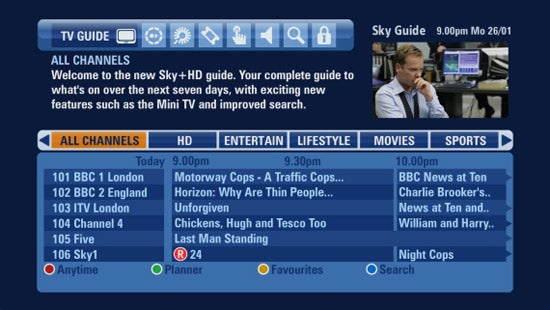
With Sky’s new ‘HD’ electronic programme guide, now available on some HD boxes, things aren’t quite as straightforward, since you can only fit six of the nine channels onscreen at once. But clearly this is only a pretty minor irritation, and is to some extent compensated for by the much superior title search engine supported by the new EPG.
However, there’s no artwork to accompany the films like you get with the Xbox 360’s listings, and the synopses of available titles are much shorter than those found on the Microsoft platform. Furthermore, you can’t access on Sky a trailer/teaser of a title you’re interested in like you can on the 360.
On the upside, the 160GB of memory built into the Sky HD box makes it easier to store more HD movies than you can on an Xbox 360. After all, standard ‘Pro’ Xbox 360s only have 60GB of memory, while even the Elite model only has 120GB.
Personally I’d still like the Sky HD box to have at least twice as much HDD space as it has, but we’re not aware of any imminent plans to introduce a new box with higher capacity, or to ‘unlock’ the extra 160GB of HDD space reserved in current Sky HD boxes for Sky’s Anytime TV system.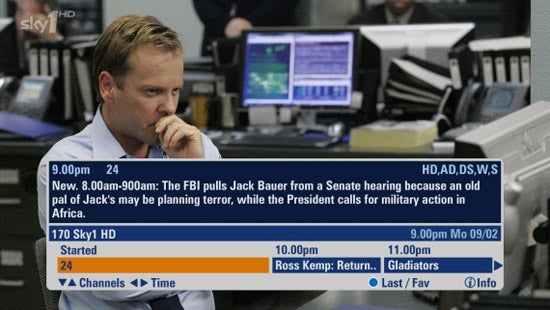
Another advantage of Sky’s delivery system is that if a film you want to watch is about to show, you can start watching it right away, whereas with the Xbox you’ll have to wait for a chosen title to download – a procedure that can take as long as a couple of hours. On the other hand, though, Sky’s HD movies aren’t ‘on-demand’. In other words, you have to wait for them to come round in Sky’s preset schedule, whereas with the Xbox’s on-demand, downloadable system, you can start downloading a film of your choice whenever you want.
Sky is still apparently planning to launch some kind of ‘on-demand’ system at some point, but we don’t yet have any firm details on when this will appear or how comprehensive it might be.
Yet another benefit of the Sky proposition is that if you record a film from the HD movie channels included in the Sky Movies package, you can keep it for as long as you like, and watch it as many times as you like. The only time you’ll find anything like the ‘watch once only’ or ‘disappears after a few days’ restrictions found with Xbox 360 movie downloads is if you record a film from Sky Box Office.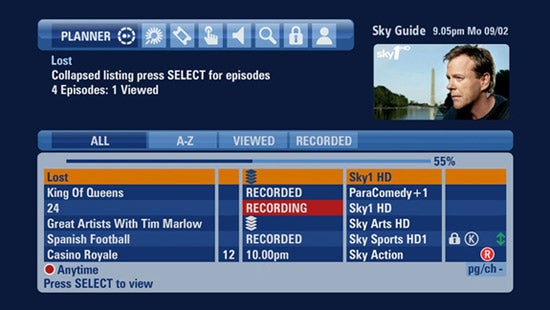
Moving finally into an assessment of the AV quality of Sky’s HD movie service, the word that best sums things up is, frustratingly, variable.
When Sky puts its mind – or rather, its bit-rate – to it, it can deliver HD delights that at least rival anything Blu-ray has to offer. The best two examples I’ve seen of this in action were two vintage movies, ”Zulu” and ”The Italian Job”, which Sky showed originally as part of a Michael Caine series a few months back, but which are now repeated sporadically on the Sky Greats HD movie channel.
Sky actually got involved with the remastering of these films into HD, and the results are nothing short of sensational. Both films look unbelievably sharp and detailed when Sky shows them, beautifully rich in colour, and devoid of noise except for any natural grain that might be in the film stock. Even the MPEG block noise that often accompanies digital broadcasts is all but non-existent whenever I’ve watched either film on the Sky HD platform.
As evidence of how far in the other direction Sky’s HD film broadcasts can go, probably the most depressing example is James Cameron’s ”Titanic”. Every time I’ve checked out this film on Sky’s HD channels, it has invariably looked so soft it’s hardly any sharper than standard definition. What’s worse, any underwater shots are practically ruined by excessive amounts of MPEG encoding noise, taking the form of either large picture blocks, or smearing. This is symptomatic of a film that’s either not being encoded into HD with a high enough bit-rate, or of a film that’s not being broadcast with a high enough bit-rate.
Therein lies the difficulty of knowing for sure where the cause of Sky HD’s inconsistency lies. For without a Blu-ray version of ”Titanic” to compare with, we just can’t tell for absolute certain if the fault with the ”Titanic” broadcasts lies with Sky not giving it enough bandwidth, or Fox for doing a shoddy HD master that Sky’s had to send out. Though the fact that a few of the other films I’ve viewed for this test have looked a bit soft too suggests that Sky’s variable bit-rate system probably isn’t completely blameless.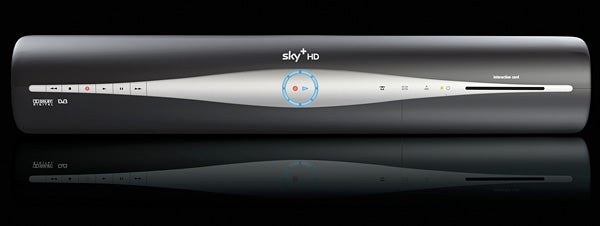
While I might not have been able to do a straight Blu-ray/Sky HD head-to-head of ”Titanic”, there are other films on Sky right now that do have Blu-ray versions available for comparison. Including ”Forgetting Sarah Marshall”.
One thing that needs to be pointed out before going any further with a comparison is that the Blu-ray version of the film is presented in 1080p/24, while the Sky broadcast is 1080i. And actually, this fact is probably responsible for the biggest advantage the Blu-ray has over the Sky broadcast, for sharp edges on the broadcast, especially around facial contours, look noticeably more jagged than they do on the Blu-ray. You’ll only see this in any obvious sort of way if you watch on a really big screen, or else sit very close to the picture, but on smaller screens it still results in a slightly fuzzy look to edges at times.
The other key picture advantage the Blu-ray of ”Forgetting Sarah Marshall” has over the Sky broadcast is that it suffers marginally less with MPEG decoding artefacts. Which is to say that there are practically none on the Blu-ray, but a very small amount on the Sky broadcast.
For instance, near the start of the film, where Peter gets a call from Sarah saying she’s going to be back earlier than expected, the lamp in the background and the skin on Peter’s forehead both look marginally more ‘alive’ with noise on the broadcast than they do on the Blu-ray. To be clear on this, though, the difference in noise levels is less pronounced than that noted with Xbox 360 downloads during Blu-ray comparisons. At a push I’d also say that the Sky broadcast looks fractionally softer than the Blu-ray, though this really is a marginal thing.
Turning to audio, I should point out, as I did with the Xbox review, that the Sky HD receiver doesn’t have the capacity to output the latest Dolby TrueHD or DTS-HD Master Audio HD audio formats. Which hands an instant advantage to the Blu-ray of ”Forgetting Sarah Marshall”, with its DTS-HD Master Audio 5.1 transfer.
However, aside from one or two momentary lip-sync errors noted during the extensive time I spent watching Sky HD movies for this article, I’d say that there’s really nothing to choose between the Dolby Digital tracks broadcast with the vast majority of recent Sky HD films, and the Dolby Digital tracks carried on Blu-ray discs or DVDs.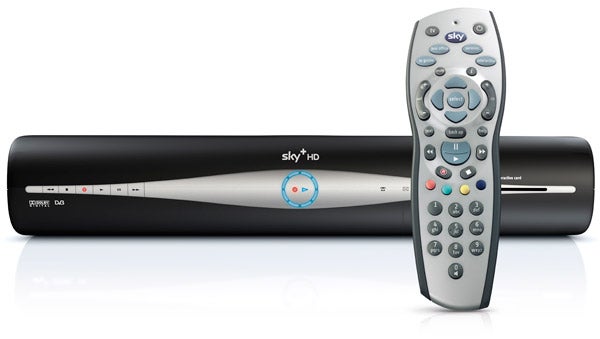
”’Verdict”’
Although Sky’s HD movie offering certainly doesn’t come cheap, your money does at least get you a genuinely massive selection of HD movie content, delivered with often good and sometimes excellent picture and sound quality. The platform’s variable bit-rate system does occasionally come a cropper, meaning that the HD picture quality isn’t as consistent as we’d ideally like it to be. But when it’s good, it’s very good indeed.
The bottom line, really, is that no matter how much handing over loads of money to Rupert Murdoch each month might stick in your craw, there’s simply no denying that for anyone wanting to get the best out of their lovely new HD TV or projector, having Sky HD is borderline essential.
Trusted Score
Score in detail
-
Value 8
-
Features 8

